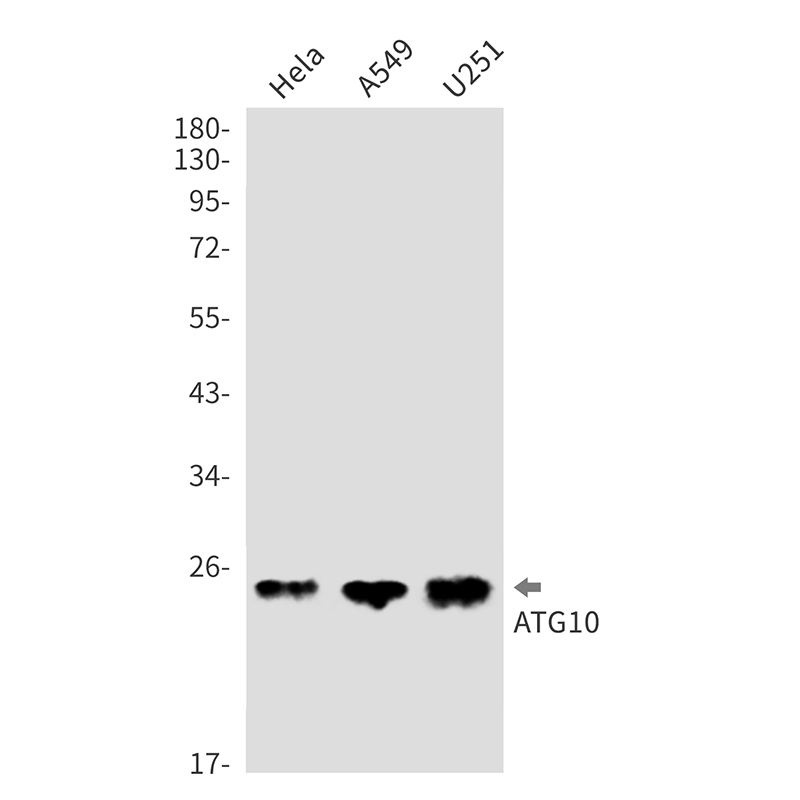
| WB | 1/500-1/1000 | Human,Mouse,Rat |
| IF | 1/20 | Human,Mouse,Rat |
| IHC | 咨询技术 | Human,Mouse,Rat |
| ICC | 技术咨询 | Human,Mouse,Rat |
| FCM | 咨询技术 | Human,Mouse,Rat |
| Elisa | 咨询技术 | Human,Mouse,Rat |
| Aliases | autophagy related 10; APG10; APG10L; pp12616 |
| Entrez GeneID | 83734 |
| WB Predicted band size | Calculated MW: 25 kDa; Observed MW: 25 kDa |
| Host/Isotype | Rabbit IgG |
| Antibody Type | Primary antibody |
| Storage | Store at 4°C short term. Aliquot and store at -20°C long term. Avoid freeze/thaw cycles. |
| Species Reactivity | Human |
| Immunogen | A synthetic peptide of human ATG10 |
| Formulation | Purified antibody in TBS with 0.05% sodium azide,0.05%BSA and 50% glycerol. |
+ +
以下是关于ATG10抗体的3篇代表性文献的简要信息(注:以下内容为示例,具体文献需根据实际研究检索):
1. **文献名称**:*ATG10 regulates autophagosome assembly by directly conjugating ATG12 to ATG5*
**作者**:Kouno T. et al.
**摘要**:该研究利用ATG10特异性抗体,通过免疫共沉淀和体外泛素化实验,揭示了ATG10在自噬体形成中的核心作用,即催化ATG12-ATG5复合物的形成,促进LC3脂化及自噬膜延伸。
2. **文献名称**:*Dysregulation of ATG10 in cervical cancer progression and its clinical significance*
**作者**:Li Y. et al.
**摘要**:通过Western blot和免疫组化分析ATG10抗体标记的肿瘤组织样本,发现ATG10在宫颈癌中高表达,且与患者预后不良相关,提示其可能通过激活自噬促进肿瘤侵袭转移。
3. **文献名称**:*Development of a monoclonal antibody specific to human ATG10 for autophagy flux detection*
**作者**:Sato M. et al.
**摘要**:该文献报道了一种高特异性人源ATG10单克隆抗体的开发与验证,证实其适用于流式细胞术和免疫荧光技术,为自噬活性检测提供了可靠工具。
如需具体文献,建议通过PubMed或Web of Science检索关键词“ATG10 antibody”或“ATG10 autophagy”,并筛选近年高影响力研究。
ATG10 (Autophagy-Related 10) is a key protein involved in autophagy, a conserved cellular process responsible for degrading damaged organelles, misfolded proteins, and pathogens. Specifically, ATG10 acts as an E2-like enzyme in the Atg12 conjugation system, facilitating the covalent linkage of Atg12 to Atg5. This conjugation is critical for autophagosome formation, a central step in autophagy. Dysregulation of ATG10 has been implicated in various diseases, including cancer, neurodegenerative disorders (e.g., Alzheimer’s and Parkinson’s), and infections, making it a research focus in autophagy-related pathways.
ATG10 antibodies are essential tools for detecting and quantifying ATG10 expression in cells and tissues. They are widely used in techniques like Western blotting (WB), immunofluorescence (IF), and immunohistochemistry (IHC) to study autophagy dynamics under different physiological or pathological conditions. For example, researchers use these antibodies to investigate how ATG10 levels fluctuate during nutrient deprivation, stress, or disease progression. Commercially available ATG10 antibodies are typically raised in hosts like rabbits or mice, targeting specific epitopes within the human or murine ATG10 protein. Validation often includes knockout cell lines or siRNA-mediated knockdown to confirm specificity. Some antibodies also distinguish between isoforms or post-translationally modified forms of ATG10. As autophagy gains attention in therapeutic research, ATG10 antibodies serve as vital reagents for exploring its role in health and disease, as well as potential drug targets.
×